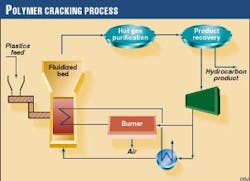BP cracks polymer recycling technique at Grangemouth
Polymer Cracking ProcessBP Chemicals has found a way to recycle waste plastics to make hydrocarbon feedstocks and has proved its process in a pilot plant at Grangemouth complex, Scotland.
David Wilson, group leader of polymer cracking at BP Chemicals, explains that the new process must be differentiated from mechanical recycling, which simply converts plastics to another form of plastic.
Wilson said most specialists reckon mechanical methods can recover only a maximum 10% of plastics, so there is a need to find new ways of recycling to meet European Union directives.
New legislation due in place in 2001 will require 15% of packaging materials to be recycled and 50% to be burned to recover energy from the discarded materials.
"This is why BP and a few other organizations have come forward with an alternative to take plastics back towards oil," said Wilson.
BP is leader of a polymer cracking group that includes DSM France SA, Elf Atochem SA, Enichem SpA, and the Association of Plastics Manufacturers in Europe.
BP came up with the polymer cracking process and developed it for the group. Other members have looked into downstream use of the recovered hydrocarbons.
Wilson said the polymer cracking process works well with polystyrene, polyethylene terephthalate, and all forms of polyethylene, polypropylene, and polyvinyl chloride.
These plastics must first be separated out by hand-"it's the only technique that works well"-at waste recovery facilities. Then the plastics need to be shredded, agglomerated, or pelletized.
From this feedstock, the BP polymer cracking unit produces a brown liquid that is a mixture of hydrocarbons, which becomes a solid wax at room temperatures.
Wilson said the liquid can be used as an intermediate feedstock for refineries and petrochemical plants and can be processed with standard techniques. It is suitable for mixing in feedstock streams.
"Some of the cracking leads to C2, C4, and C5 gas molecules," said Wilson. "These account for 10-15% of polymer cracking plant output and would be burned in a commercial plant to provide heat.
"The remaining 85% of the output is molecules in the C5 to C50 range of intermediate feeds, which can be readily turned into monomers, such as ethylene, propylene, and butenes."
Wilson said a polymer cracking plant with capacity to recycle 20,000 metric tons/year of plastics would be able to handle the waste of a city of 1 million inhabitants.
"The consortium will make polymer cracking technology available to others," said Wilson. "Our feeling is that utilities or waste management companies may be best suited to bring the technology to market.
"In the last few weeks, we have got to the point where pilot plant productivity has reached an acceptable level. Now we plan to get together partners for a demonstration plant."
The pilot plant has capacity to process 50 kg/hr of plastics waste. Wilson said the consortium aims to have a demonstration plant operational in 2001, with capacity of 25,000 metric tons/year.
"This would require a £20-25 million ($32-40 million) investment," said Wilson. "Near a refinery is the best location for a polymer cracking unit. A reasonable location would be Grangemouth."
Copyright 1997 Oil & Gas Journal. All Rights Reserved.
